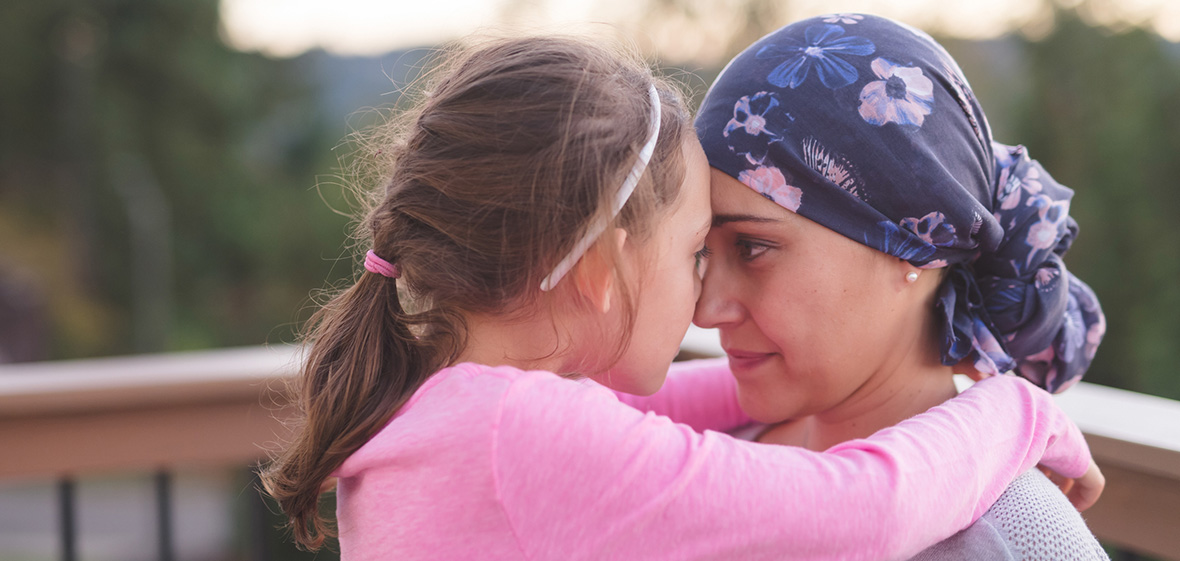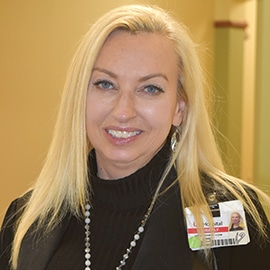
If you or a family member has been diagnosed with cancer, and if you have or care for children, it is normal to feel anxious and scared as you think about telling children about the diagnosis. It is natural to want to protect children from anything that could cause them to feel sad or worried.
Like any important family issue, the illness should be discussed in a thoughtful way. This helps children cope and not feel left alone with their feelings. Reflecting on the strategies that have helped a child with past challenges may offer clues as to how to support them now.
Every child responds differently to news of a cancer diagnosis. Some may have many questions, while others may prefer not to talk. The important thing is to let children know that you or another adult close to them is available to listen, provide care and offer support when they are ready to talk.
We’ve put together guidelines on how children of different ages may respond to a cancer diagnosis. We encourage you to use this as you consider how to best communicate the news with children.
Children Ages 3–5
For children ages 3-5, their age and level of thinking makes it difficult for them to understand illness and death. They may believe they have caused the illness or that they can catch the illness. They can sense changes and distress in the home.
After telling a child what is going on, they may experience separation anxiety. They may also display changes in behavior, such as bedwetting, clinginess, stuttering, nightmares or thumb sucking.
The following steps can help you explain a cancer diagnosis to children ages 3–5:
- Read a children’s book explaining cancer to them.
- Explain any changes in your children’s routine or their caregivers’ responsibilities.
- Provide a brief and simple explanation about the diagnosis and care plan.
- If you or another parent or caregiver has cancer, provide reassurance that your child will always be cared for.
- Encourage emotional expression throughout the family, like saying, “It’s OK to cry.”
- Encourage children to still have fun and play.
- Reassure children that they cannot catch cancer like a cold or a virus.
- Reassure children that they did not do anything to cause the cancer.
- If children ask how to help, encourage them to do chores or small tasks in the house.
- If children will visit you or a relative or caregiver with cancer in the hospital, prepare them for what they will see and structure the visit with a fun activity to do in the room.
After the conversation, young children may go play or change the topic. It is important to remember that this does not mean they don’t care. Young children process information differently than adults and often need time to absorb the information.
Children Ages 6–8
Children ages 6-8 may believe in cause and effect. They might think, “I said ‘I hate you’ to daddy, and that’s why he got cancer.”
Children in this age range may also be developing logical thinking skills that can impact how they process the illness. For example, children may understand the difference between real and pretend, but they may think that their thoughts or wishes can influence the future. They might think something like: “If I hope mommy gets better, she will.”
After telling children about a cancer diagnosis, they may experience the following:
- Difficulty containing their emotions
- Blaming themselves when bad things happen
- Separation anxiety or clinginess
- Stomachaches
- Changes in grades or academic performance
- Withdrawal from their friends or favorite activities
The following are steps that can help explain a cancer diagnosis to children ages 6–8:
- Read a children’s book explaining cancer to them.
- Provide simple, specific, disease-related information such as the name of the disease, its symptoms, the care plan and the prognosis.
- Give a simple explanation of the relationship between your behavior and the symptoms or treatment of the cancer, such as, “I am tired from my medicine.”
- Reassure children that they did not do anything to cause the cancer.
- Reassure children that they cannot catch cancer like a cold or a virus.
Children Ages 9–12
Children ages 9-12 may be developing critical thinking skills and can understand cause and effect. Children in this age range may be able to understand more detailed information about cancer and the concept of death. Ask them what they understand, and correct or add information for clarity.
After telling children about the diagnosis, they may experience the following:
- Daydreaming, lack of attention, difficulties in thinking clearly or issues with concentration
- Changes in academic performance
- Headaches or stomachaches
- Sadness or frequent crying
- Trouble regulating emotions
- Using distraction to avoid strong emotions
The following are steps that can help you explain a cancer diagnosis to children ages 9–12:
- Have children read a book explaining cancer.
- Use the proper name of the disease, such as breast cancer or brain tumor.
- Provide detailed, specific explanations about the illness and care plan to help children gain a sense of control.
- Explain that cancer is not contagious like a cold or virus.
- Reassure children that they did not do anything to cause the cancer.
- Ask children about their understanding of the illness, and correct or add information for clarity.
- Validate children’s feelings.
- Invite children to ask questions about the cancer diagnosis and treatment. If you don’t know the answers, assure them that you’ll find out.
Teenagers (Ages 13–18)
Teenagers may be better able to comprehend illness and treatment, and they may be able to understand the cause of a treatment’s side effects. Teenagers may be capable of abstract thinking, meaning they can think about things they have not experienced themselves. They may also be starting to think more like adults.
After telling a teenager what is going on, they may feel guilty about spending time with friends and doing activities without the affected person. Teenagers may deny fear and worry to avoid a discussion about cancer and treatment. Teenagers may also display behavioral and emotional changes, such as withdrawal, apathy, arguing, depression, anxiety or self-harm.
The following are steps that can help you explain a cancer diagnosis to teenagers:
- Explain that there is no wrong or right way to feel and that fear, sadness, anger and even having no feelings at all are all normal reactions.
- Let teenagers know that if it’s difficult to talk to you about feelings, there are others who can listen and help.
- Provide teenagers with information in a factual and age-appropriate manner.
- Delegate appropriate tasks to allow teenagers to feel included in the process and give them a sense of control in an uncontrollable situation.
- Talk about potential role changes in the family and prepare teenagers for possible changes in their
- Offer resources for learning more about cancer and getting support.
- Encourage teenagers to talk about their feelings but realize they may find it easier to confide in friends, teachers, school counselors or other people close to them.
UofL Health – Brown Cancer Center is Here for You
For the past 40 years, UofL Health – Brown Cancer Center has been a leading face of world-renowned academic research and cancer care. As a result, we help patients face cancer with new hope throughout Kentuckiana and around the globe. Call 502-562-HOPE (4673) to learn more and make an appointment.









